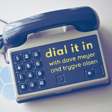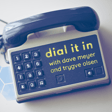
S2 Ep22 Navigating the CMO Landscape- Insights from Bryan Smith on Marketing with Heart
In this episode of Dial It In, we had the pleasure of hosting Bryan Smith, the founder of Tuned Consulting, a fractional chief marketing officer organization. Bryan shared his journey from corporate marketing to starting his own business, emphasizing the challenges and triumphs of transitioning to entrepreneurship.
We kicked off the conversation with a nostalgic trip down memory lane, reminiscing about the music of the 90s and how it helps us focus during work. This set the stage for a deeper discussion on the importance of simplicity in marketing and the power of humanizing business strategies.
Bryan enlightened us with his approach to marketing, which he describes as "trilingual," adeptly bridging the gaps between sales, marketing, and product management. He highlighted the significance of aligning these teams to enhance customer-centric strategies and shared how his unique perspective helps businesses streamline their go-to-market approaches.
A highlight of the episode was Bryan's recount of a successful campaign from his tenure at Tennant Company, where they celebrated school janitors. This campaign not only generated significant brand engagement but also showcased the impact of community-focused marketing initiatives.
Bryan's insights into overcoming imposter syndrome and the importance of valuing one's work resonated deeply, offering valuable lessons for professionals at any career stage.
For those interested in learning more about Bryan's work or seeking guidance on marketing strategies, he can be found at Tuned Consulting or on LinkedIn.
…
Dial It In Podcast is where we gathered our favorite people together to share their advice on how to drive revenue, through storytelling and without the boring sales jargon. Our primary focus is marketing and sales for manufacturing and B2B service businesses, but we’ll cover topics across the entire spectrum of business. This isn’t a deep, naval-gazing show… we like to have lively chats that are fun, and full of useful insights. Brought to you by BizzyWeb.
Links:
Website: dialitinpodcast.com
BizzyWeb site: bizzyweb.com
Connect with Dave Meyer
Connect with Trygve Olsen

